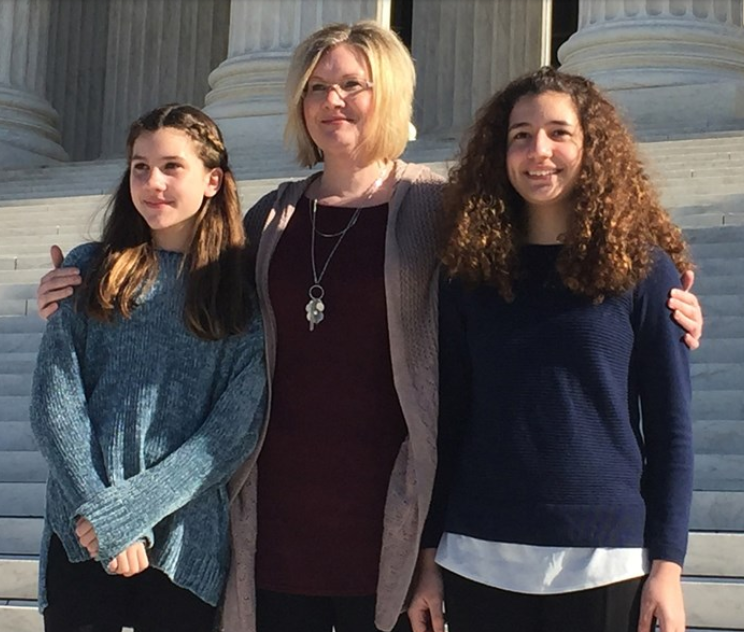
Editor’s note: During the holiday season, redefinED is reprising the “best of the best” from our 2020 archives. This post originally published June 30.
![]() In a landmark decision today on school choice, the U.S. Supreme Court ruled that the Montana Department of Revenue’s shutdown of a tax-credit scholarship program for low-income students is unconstitutional, potentially opening the door for states to enact such programs for students to attend private faith-based schools.
In a landmark decision today on school choice, the U.S. Supreme Court ruled that the Montana Department of Revenue’s shutdown of a tax-credit scholarship program for low-income students is unconstitutional, potentially opening the door for states to enact such programs for students to attend private faith-based schools.
The court said in its 5-4 decision on Espinoza vs. the Montana Department of Revenue, written by Chief Justice John Roberts, that the Montana Department of Revenue cannot disqualify religious schools simply because of what they are.
“A State need not subsidize private education. But once a State decides to do so, it cannot disqualify some private schools solely because they are religious,” the opinion said.
The ruling also stated:
“Drawing on ‘enduring American tradition,’ we have long recognized the rights of parents to direct ‘the religious upbringing’ of their children … Many parents exercise that right by sending their children to religious schools, a choice protected by the Constitution.”
Roberts was joined by Justices Samuel Alito, Clarence Thomas, Brett Kavanaugh and Neil Gorsuch. Dissenting were Justices Ruth Bader Ginsburg, Sonia Sotomayor, Elena Kagan and Stephen Breyer.
“The Supreme Court delivered a major victory to parents who want to choose the best school for their children, including religious schools,” said Institute for Justice senior attorney Erica Smith, who was co-counsel on the case. “This is a landmark case in education that will allow states across the country to enact educational choice programs that give parents maximum educational options.”
Organizations that support education choice praised the decision.
“It’s a good news day for those who love the freedoms we enjoy in this country and seek to advance and preserve those freedoms,” said Leslie Hiner, leader of the Legal Defense & Education Center for the nonprofit advocacy group EdChoice. “Today the Supreme Court has re-affirmed its role as the guardians of our Constitution. The Montana Supreme Court has disregarded the U.S. Constitution, and in particular the First Amendment’s clause protecting our right to the Free Exercise of whatever faith we choose as individuals, when it struck down a modest school choice program that allowed parents to choose any school, religiously-affiliated or not, for their children’s education.”
The case started in 2015, when the Montana Legislature enacted a program that provided a dollar-for-dollar tax credit for taxpayers who donated to a Student Scholarship Organization. That meant a Montana resident could donate to a scholar organization, and in turn, would receive a tax credit for the donation.
The Student Scholarship Organization used the donated money to provide scholarships to students to attend private schools, including private schools affiliated with a religion.
Shortly after the program was enacted, the Montana Department of Revenue promulgated an administrative rule (“Rule 1”) prohibiting scholarship recipients from using their scholarships at religious schools, citing a provision of the state constitution that prohibits “direct or indirect” public funding of religiously affiliated educational programs.
Kendra Espinoza and the two other mothers filed a lawsuit in state court challenging the rule. The trial court determined that the scholarship program was constitutional without the rule and granted the plaintiffs’ motion for summary judgment. On appeal, the Department of Revenue argued that the program is unconstitutional without Rule 1. The Montana Supreme Court agreed with the Department and reversed the lower court.
At issue in the case are Blaine Amendments, also called “No Aid” clauses, which are provisions in 38 state constitutions, including Florida’s, that bar public aid to religious organizations. They get their name from James G. Blaine, a congressional representative and later senator and presidential nominee from Maine who unsuccessfully attempted to amend the U.S. constitution in 1875 to include “anti-aid” language onto the end of the first amendment. Where he failed at the federal level, many states inserted Blaine Amendments into their constitutions. As a result, Blaine Amendments frequently act as state-level barriers against school choice.
“I am thrilled that the courts ruled in favor of the Constitution and maintained a parent’s right to choose where their children go to school,” Espinoza said in a news release issued by the Institute for Justice. “For our family, this means we can continue to receive assistance that is a lifeline to our ability to stay at Stillwater. For so many other families across America, this will potentially mean changing lives and positively altering the future of thousands of children nationwide. What a wonderful victory.”
The win and the promise of continued scholarships is a significant boost to Espinoza, who has had to work multiple jobs, including cleaning houses and doing janitorial work, to afford her daughters’ tuition payments at a private Christian school in Kalispell. Kendra transferred her two daughters to Stillwater Christian School after they struggled in their public school. Montana’s scholarship program has helped Kendra and families across the state keep their children in the school that works best for them.
“It’s been a century-and-a-half since the bigoted Blaine movement took root in state constitutions throughout the country,” IJ Senior Attorney Richard Komer, who argued the case before the Court said in the news release. “Today’s decision shows that it is never too late to correct an injustice, even one with as long and ignoble a pedigree as this one.”
Today’s decision will affect most of the 14 states that have strictly interpreted their state constitution Blaine Amendments to bar scholarships to children at religious schools. For decades, the creation and expansion of school choice programs have been inhibited by legislative concerns that they might conflict with state constitutions. Those concerns are now removed with today’s decision in Espinoza.


